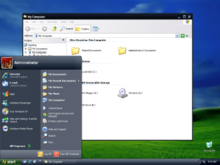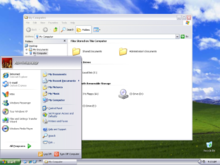Windows XP visual styles
Windows XP visual styles are
Compared to Desktop Themes in previous versions of Windows such as Microsoft Plus! for Windows 95, Windows 98, and Windows Me, the new visual styles have a greater emphasis on the graphical appeal of the operating system, using saturated colors[3] and bitmaps[4] throughout the interface, with rounded corners for windows.[5][6]
The visual styles API was substantially expanded in Windows Vista and later. Nevertheless, the API remained heavily underdocumented.[7]
Luna
"Luna" (the Moon in Latin and various other languages) is the codename for the default visual style of Windows XP. Officially known as "Windows XP style", it is available in three color schemes: blue (default), olive green, and silver.[6][8] Critics who did not like the theme characterized it as a "Fisher-Price interface" among other names, due to its perceived childish nature and design.[9][10]
Luna was also present as a placeholder theme in all pre-reset Windows Vista (Longhorn) builds alongside the Plex, Slate and Jade themes, as well as the very early "Omega-13" post-reset builds 3790, 5000, 5001, and early Beta 1 builds 5048 and 5059. It was absent from all post-reset builds starting with build 5098 after the unveiling of Aero in build 5048.
Luna Beta
Luna Beta is an earlier version of the Luna theme that was first previewed at CES 2001 and included in beta builds from builds 2428 to 2465, and later appeared in the leaked source code of Windows XP in September 2020. Officially known as "Whistler style", it is mostly similar to the final Luna theme, with some slight differences (such as the scrollbar being brighter, taskbar buttons having a more different shape, as well as the start button being more shinier). This theme is unofficially available as a separate theme made by enthusiasts.
Windows Classic

Officially titled "Windows Classic style", this is the built-in look and feel of Windows that was used in previous versions of Windows prior to Windows XP. It is used when the theme service is disabled and in certain other scenarios, such as
Compared to other visual styles, it supports greater color and
The style was removed from Windows Server 2012 and Windows 8, however, it still exists internally for backward compatibility purposes.[citation needed]
Royale

Royale (also known as Energy Blue and Media Center style) was originally designed for
Royale was originally made available in December 2004. On April 7, 2005, Microsoft New Zealand[15] had made the Royale theme and the wallpapers for the New Zealand theme available for download[16] for all editions of XP through Windows Genuine Advantage on its website but no longer exists in 2019. Because of the freeware nature of this package, it had also been available on software download websites, such as Softpedia at one time.[17]
Microsoft did also release a
Royale Noir

Royale Noir looks like a darkened version of Royale, having a blackish and bluish to purple tint. Royale Noir has a black
Zune

A few weeks after Royale Noir was leaked, Zune was officially released in a theme package to accompany the release of Microsoft's new Zune media player. In terms of style, Zune resembles Royale and Royale Noir, particularly the latter. It displays a brown to light shadow style and is the first publicly released visual style for Windows XP to include a differently colored Start button from the green XP,[20][21] which is colored orange in the Zune theme.
Embedded

Watercolor

Watercolor (internally named "Business" and codenamed "Professional") is a placeholder theme present in pre-release builds prior to Beta 2, and later appeared in the leaked source code of Windows XP in September 2020. Officially known as "Watercolor button style", The theme more closely resembles Windows Classic, featuring sharp edges and similar window proportions. It features a primarily blue and white style with mostly flat shading and retains certain UI elements from the Classic theme style. This theme is unofficially available as a separate theme made by enthusiasts.
Mallard
Mallard is an internal name of a placeholder theme that was designed as a decoy to show to the public during Beta 2's development while designers privately worked on Luna.[22] It was present in certain builds given out to testers, all of which eventually leaked onto the internet, and later appeared in the leaked source code of Windows XP in September 2020. Officially known as "Sample Test Visual Style", It features two color schemes, Chartreuse Mongoose, which features a primarily green and orange style, and Blue Lagoon (internally named as Paler), which uses a teal and purple style, though both themes feature an orange start button with a green notification area as well as a slight curve on the left-hand side of the title bar. This theme is unofficially available as a separate theme made by enthusiasts.
Candy
Candy is an unannounced and unreleased theme which was found in the leaked source code of Windows XP in September 2020. According to the date found within the metadata of the files in the theme, it was made between builds 2250 and 2257. Candy seems to be an imitation of the Aqua theme found in earlier versions of Mac OS X (10.0 to 10.6).[23] Not much is known about its purpose, however it was likely meant as a way to test the theming engine that was first available in build 2250. According to some publicly available screenshots, only some UI elements, such as buttons, scroll bars, and the Start menu, had been redesigned to look like Mac OS X's Aqua theme style; others still used the Classic theme style.
Third-party visual styles
Windows only loads a visual style that bears a valid Microsoft
Application support
Third-party applications can be configured to work with visual styles. By default, the title bar and the window borders of
See also
References
- ^ US patent 7752631, Dorn, Karlheinz; Plendl, Mario; Scharf, Christian; von Stockhausen, Hans-Martin, "Device and method for a graphical user interface", issued 2010-07-06, assigned to Siemens
- MSDN. Microsoft. Archivedfrom the original on 2012-10-23. Retrieved 2012-05-26.
- ^ Kumar, Anil (2010-12-27). Scudder, Rebecca (ed.). "Windows 7 Themes for XP from Deviant Art". Bright Hub. Archived from the original on 2013-10-16. Retrieved 2014-06-20.
- ISBN 978-1-118-26459-1.
- PC Magazine. Ziff Davis. Archivedfrom the original on 2012-06-29. Retrieved 2014-06-16.
- ^ a b c Nadeau, David Robert (2010-05-09). "Java tip: SystemColors for Windows XP user interface themes". Nadeau Software Consulting. Archived from the original on 2014-02-13. Retrieved 2014-06-16.
- ^ "Custom Controls in Win32 API: Visual Styles". 21 July 2013.
- ^ "ThemeColor Enumeration". MSDN. Microsoft. Archived from the original on 2012-12-08. Retrieved 2014-06-16.
- PCWorld. IDG. Archived from the originalon 2009-10-08.
- ^ Bright, Peter (2014-04-10). "Memory lane: Before everyone loved Windows XP, they hated it". Ars Technica. Condé Nast. Archived from the original on 2014-04-24. Retrieved 2014-06-20.
- ^ "Tweak Windows XP :: Disabling Themes". TechReviewer.com. Archived from the original on 2012-08-01. Retrieved 2012-05-26.
- ^ These are known as "High Contrast #1", "High Contrast #2", "High Contrast White" and "High Contrast Black" respectively.
- Penton Media. Archived from the originalon 2010-05-22. Retrieved 2009-04-28.
- ^ Thurrott, Paul (2005-05-08). "Microsoft Gives Royale Theme to All Windows XP Users". Windows IT Pro. Penton Media. Archived from the original on 2014-06-16. Retrieved 2014-06-16.
- ^ "Desktop Backgrounds for Windows Genuine Windows download". Microsoft. Archived from the original on 2006-02-07.
- ^ "Royale Theme". Microsoft. Archived from the original on 2005-11-28.
- ^ "Royale Theme". Archived from the original on 2006-04-07.
- ^ Kendrick, James (2005-07-23). "I hate Outlook with the Energy Blue theme". Gigaom. GigaOmniMedia. Archived from the original on 2014-06-20. Retrieved 2014-06-20.
- ^ Zheng, Long (2006-10-29). "Royale Noir: secret XP theme uncovered". istartedsomething. Retrieved 2008-08-22.
- ^ Katta, Sahas (2006-11-05). "Windows XP – Zune Theme". Skatter Tech. Archived from the original on 2014-06-17. Retrieved 2014-06-17.
- from the original on 2012-12-26. Retrieved 2014-06-17.
- ^ "The decoy visual style". 11 January 2006.
- ^ Warren, Tom (Sep 26, 2020). "Microsoft had a secret Windows XP theme that made it look like a Mac". The Verge. Retrieved Oct 6, 2020.
- ^ Orlowski, Andrew (2001-02-16). "Compatibility woes derail Windows XP Visual Styles". The Register. Situation Publishing. Retrieved 2014-06-16.
- ^ Jijau, Dragos (2007-01-18). ""Hack" Windows XP Visual Styles". Softpedia. SoftNews NET. Retrieved 2014-06-16.
- ^ Fitzpatrick, Jason (2008-09-30). "How to Use Custom Windows Visual Styles". Lifehacker. Gawker Media. Retrieved 2014-06-16.
- ^ "Third-party themes programs may not work as expected after you install Windows XP Service Pack 3". Microsoft Support. Microsoft. 2008-05-06. Retrieved 2012-04-30.
- ^ Prabhu, Raghavendra (2003-09-28). "Application.EnableVisualStyles - Cool Client Stuff". MSDN Blogs. Microsoft. Archived from the original on 2014-05-09. Retrieved 2014-06-17.
- ^ Grossman, Seth (January 2001). "Using Windows XP Visual Styles With Controls on Windows Forms". MSDN. Microsoft. Archived from the original on 2013-09-28. Retrieved 2012-06-17.
- ^ "Enabling Visual Styles". MSDN. Microsoft. 2012-10-27. Archived from the original on 2013-03-22. Retrieved 2014-06-17.
- ISBN 978-1-4302-0844-0.







